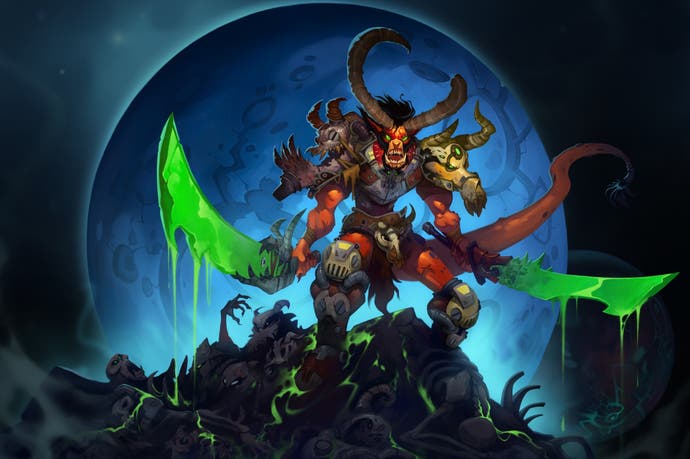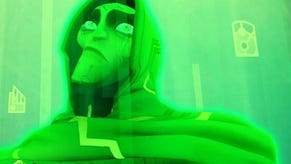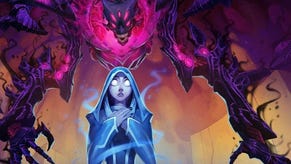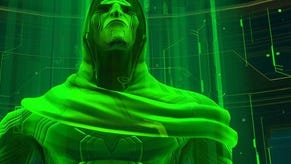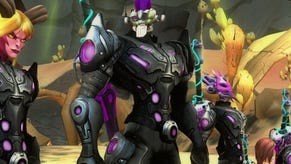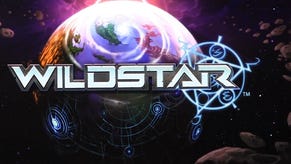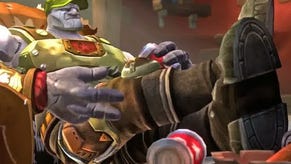WildStar preview: Happy hunting?
Carbine unveils the Dominion proving grounds.
Deradune is a good place to fight crabs. It has endless supplies of them, actually, so for a good half hour, fighting crabs is what I chose to do. Down by a silty shoreline running alongside a tidy curve of ocean, I found a gleaming radar dish that summoned crate after crate of crab-monsters for me to slice through. I was playing as a Mechari, a robot race defined by a penchant for skull-shaped face-plates, so I was pleasantly tankish, yet blessed with a couple of nimble sword attacks and - best of all - an arrogant little flourish when I stowed weapons after a kill. Class-wise, I was a stalker, a stealthy set-up which sees your offensive powers boosted if you get the knife in when your foe's facing away from you. The crabs didn't really have a chance.
Fighting things in WildStar is pretty entertaining, which turns out to be a good thing as this MMO presents an awful lot of opportunities for fighting things. Alongside better-than-average combat animations and a lovely moment where you hoover up loot afterwards, the team's made a real effort to bring something distinct to its futuristic brawls. Don't think of it as a reinvention, think of it as a rebalancing: each class still has a candystore tray for hot key actions and their attendant cool-downs, but WildStar also wants you to look up from the UI at the bottom of the screen while you work, too. It's taken the area-of-effect telegraphing templates you often see in other games, and it's built them deep into the moment-to-moment skirmishes that erupt with even the smallest of enemies. Your aggressor broadcasts their next move in a bold red circle or triangle of potential damage, you dodge out of the way and then lay down your own bright blue template in return. Movement counts, positioning counts, and crabs, it turns out, are terrible at grasping this sort of nuance. Sure, the whole thing adds another layer of abstraction onto MMO scraps - I'm gonna triangle that guy up good and proper, and then circle him into oblivion - but it's not the bloodless geometry exercise you might expect.
Focusing in on this sort of combat is one of a handful of genuinely pinchable ideas that WildStar has added to the standard MMO design, in fact. That's how this sub-set of games often seems to evolve: you get new fiction, new lore, and new heroes each time, but what really matters are the little quirks. Nobody really dares deviate from the Warcraft template too much unless they're planning something really drastic or niche, so games become defined by the neat touches and clever embellishments. A stronger emphasis on telegraphing templates to add an extra spatial zing to battles? That sounds smart, and it turns out to be a good idea. Elsewhere, now that WildStar's lurching towards a 2013 release, we're starting to see other tweaks, too. Alongside the introduction of 'paths', a system that sees you picking a playstyle as well as a class and race and faction - focusing on exploration, say, or social stuff - PvPers can look forward to something called Warplots, which brings other games' housing systems into the mix in huge shared battlegrounds where groups can really put their stamp on their surroundings. That sounds pretty smart too, as does the plan to provide regular - monthly, hopefully - story content updates for end-gamers who have hit the level cap.
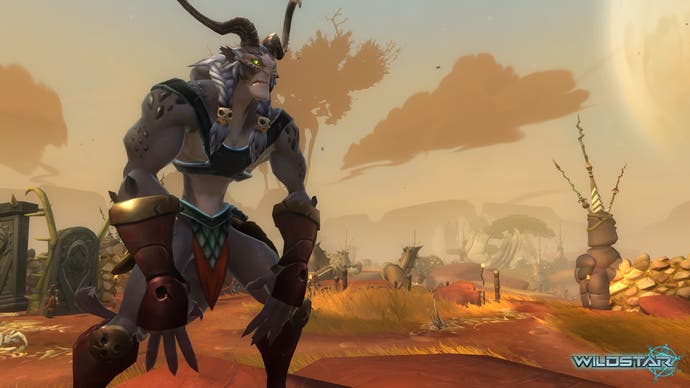
Warplots and end-game stuff will have to wait for the time being, however. Right now, WildStar's more interested in showing off a new area (Deradune), a new faction (the baddies), and three of the races that faction's composed of. This isn't WildStar the Warcraft-beater we're playing today, then. It's the lavish, expensive base the team needs to build first: WildStar the Warcraft-equivalent.
Just to provide a little context, NCSoft's latest is a sci-fi MMO set on a mysterious planet called Nexus. That makes it sound like a mid-level Manhattan hedge funds company, perhaps, but the place is actually a highly sought-after prize, the former homeworld of your classic gang of super-powerful aliens who once ruled the galaxy and then disappeared, leaving an intriguing mess behind them. Nexus is that mess, in fact, crackling with dormant tech and wacky magic, and it's become a prime destination for a faction known as the Exile. These are the goodies: plucky scavengers hunted through the galaxy by an evil empire.
The evil empire are called the Dominion, and they're shaping up to be an entertaining collection of baddies. I'll probably play Dominion when WildStar finally launches, actually. Like the Exile, they have a human race in the mix - a gang of chilly, rather arch aristocrat types with English accents and 19th century stylings. They also boast the Mechari, those skull-faced robot damage-sponges whom I employed for my private vendetta against crabs, and the Draken. The Draken are going to be the stars, I suspect: part Wolverine, part Hellboy, part grumpy billygoat they're covered with fur and horns and sharp teeth, and they race around in a wonderfully animalistic fashion.
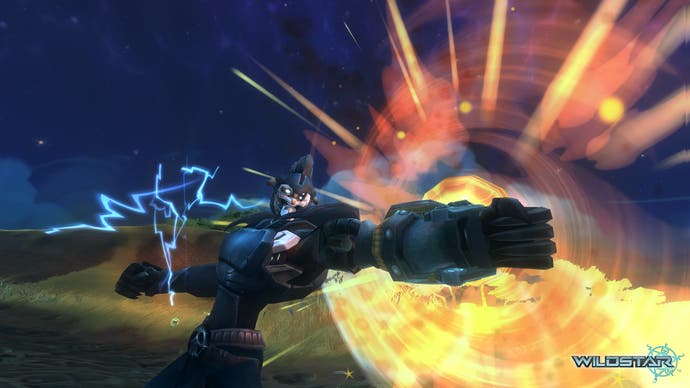
Deradune is the Draken's backyard: a proving ground for young hunters where all manner of deadly mobs stalk the open plains, and even nastier mobs are regularly crated in to keep things exciting. The map's built with level 6-12 players in mind, which means it's going to be the first place Dominions get to yomp about in after they're through with all the tutorial stuff, and it's gorgeous.
WildStar uses the bold colours of Warcraft, but layers on the cartoony excess even more heavily. The development team at Carbine describes the game as being "high personality" above all else, and in an area like this you can really see what they mean. Deradune's all savannahs and cliffs, golden grasses giving way to fat honey-coloured crags. The trees have wide canopies supported by trunks that trail and bunch like tentacles, and the buildings resemble exotic glass bottles flung into the sand of some day-dreamed beach.
Deradune's gigantic, but it's also rammed full of stuff to do - alongside personality, the team's putting a premium on sheer density. There's story stuff, of course, which sees you taking on hunting challenges and fighting groups of poachers, and then there are the random challenges that pop up as you wander around, too: kill a bunch of these things, kill a bunch of those things really fast.
And there are the path missions, with each discipline getting its own optional quests. Soldiers get to activate beacons that call in waves of enemies and bosses to defeat, for example, while explorers get sent off to visit hard-to-reach spots - activating doodads in the higher branches of trees, perhaps, or scaling a cliff to take in a vista. Explorers also get to open up tunnel networks beneath the map, which have their own secrets to track down as well as one big perk: they see you moving across the overworld at roughly four times the normal speed, meaning followers of this path will effectively be able to fast-travel. The final two paths, settler and scientist, will both get their own quota of tailored quests, too, but that stuff's still under wraps at the moment. The important thing to note is that path choices stick: if you're an explorer, you won't be able to trigger holdouts (although you will be able to wade in when a soldier does). If you're a soldier, you won't be able to access those secret tunnel networks (although you might be able to follow an explorer down there on occasion).
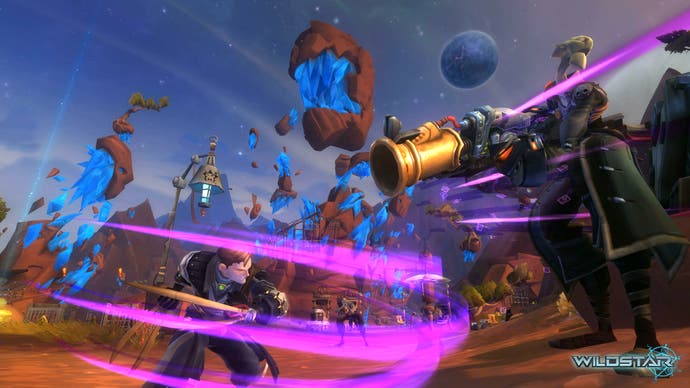
Even with that gating in place, there's so much to do in Deradune that it becomes a little paralyzing at first: the map's a clutter of icons and quest pointers from the moment you're cut-scened onto it in the back of a spaceship, and, playing as a grizzly Draken explorer, my personal communicator is soon flashing away with incoming messages and requests as I poke around. (Having what amounts to a mobile phone in a fantastical sci-fi MMO is frequently hilarious, incidentally: it's not uncommon to check the UI and see a phrase like "Missed Call: Bloodrush!" staring back at you. I must catch up with that guy.)
The Draken's charismatic to the point that you'll feel like you own the map long before you're levelled-up enough to take on some of its meaner enemies, but its stalker slash attacks and pounce move should allow you to get out of most self-imposed scrapes. Switch to Mechari, meanwhile, and the metallic heaviness of the race translates into near invulnerability in most skirmishes but also drastically seems to cut down your movement speed. Fleet-footedness returns if you play as a human yet all of a sudden you realise how small you are compared to everyone else. Deradune is a land of relative giants, by and large, and these hunting grounds, stuffed with opportunities for adventure, can suddenly seem rather threatening.
It's not surprising that an MMO built with this kind of obvious care has so much stuff for you to do, of course - or so many ways for you to do all of it. One of Carbine's more startling development statistics is that they're currently making nine square kilometers of new area every eight weeks or so. What is a little surprising, though, is that, variety and density notwithstanding, Deradune isn't currently quite as much fun to explore as I'd expected it to be, regardless of what character I'm trying out. All that density and personality have yet to really fuse into something distinct.
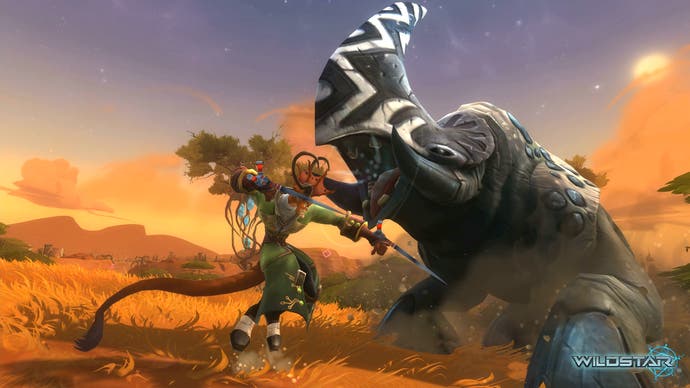
Partly this could be down to the fact that MMOs are a nightmare for developers to preview properly. So much of the experience comes from a sense of investment: of picking a character, getting its face and colour scheme all wrong, choosing the single worst class available, and then working your way through the early stages of the game until you've unlocked a bunch of skills you don't understand properly. It's just not the same dropping into a premade avatar and starting at level 6. Equally, while Deradune's packed with stuff, a lot of the more intriguing systems aren't in place yet - because they aren't ready to be unveiled. There are craft nodes scattered around, but Carbine's not talking about crafting yet, for example, and, like the Warplots, basic housing stuff isn't on the table either.
Still, though, for all its style and ingenuity, WildStar may suffer from the kind of Warcraft burnout that all MMO designers must stay awake at night worrying about: moment-to-moment, it can currently feel like a clever, polished new version of a game that you've played again and again over the last decade in a number of different configurations. Familiarity can be nice when you're exploring a bold new online universe, of course, but it might also make that universe feel a little less bold than it should be.
Carbine's clearly a smart and considerate and experienced bunch, and WildStar fairly reeks of thought and ambition. Hopefully, a few months down the line, when the whole thing's really coming together, this mysterious alien planet will start living up to its obvious potential.
